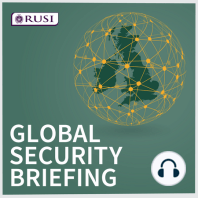48 min listen

What Next for International Conflict Stabilisation?
What Next for International Conflict Stabilisation?
ratings:
Length:
44 minutes
Released:
Feb 23, 2022
Format:
Podcast episode
Description
This episode examines the future of international efforts to build stability, prevent conflict and meet security challenges in the most fragile and conflict-affected states and societies around the world following the perceived failure of Western-led stabilisation efforts in Afghanistan and Iraq. Simon Rynn, RUSI Senior Research Fellow for African security, Ahmed Hassen, RUSI Associate Fellow, and Ada James Emanuel, an independent researcher, discuss with Dr Neil Melvin, Director, RUSI International Security Studies, the set of ideas that underpin international stabilisation efforts, the experience of applying these concepts over the past two decades, lessons learnt, and the future challenges of promoting stabilisation as geopolitical competition becomes an increasingly important part of regional conflicts. The contemporary experiences of Somalia and northeast Nigeria are considered.
Released:
Feb 23, 2022
Format:
Podcast episode
Titles in the series (100)
The UK, Russia and Strategic Stability: This episode examines the re-emergence of the concept of strategic stability as a means of managing security relations between Russia and the transatlantic community and avoiding war. Following Moscow’s annexation of Crimea in 2014 and its military... by Global Security Briefing